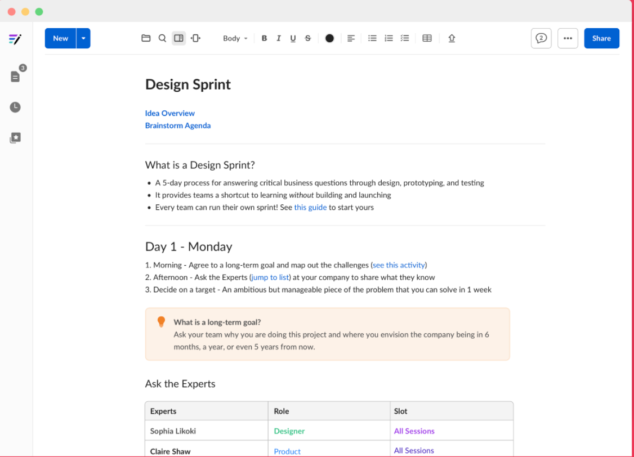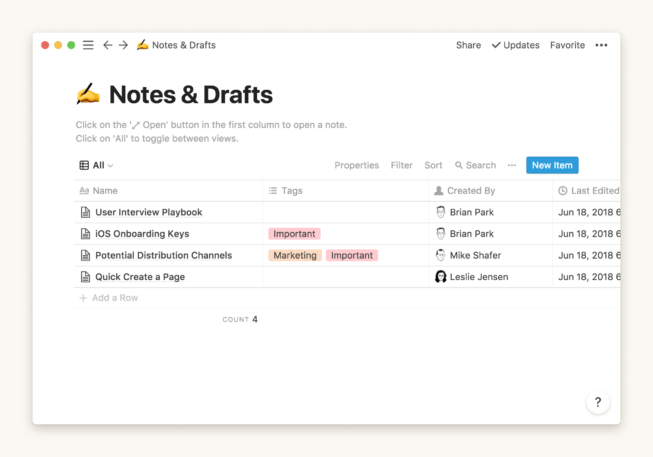It took several decades, but the newest document editors have finally stopped copying Microsoft Word.
Modern editors such as Notion and Coda don’t mimic the printed page. Rather, using them feels more like browsing the web. Their writing spaces flow freely without page breaks, and they can branch into subpages that link among themselves. Those pages are also interactive by nature, with checkboxes, charts, Trello-like kanban boards, and tie-ins to outside data sources.
Coda
While Notion and Coda have both been around for several years, their approach is suddenly attracting a lot of competition. Google Docs added interactive checklists and simpler linking to other documents earlier this year. A future update to Box’s Box Notes will add anchor links, callout boxes, and overhauled tables. The project management tool Monday launched a document editor in August with clear nods to Notion’s drag-and-drop content blocks. Microsoft itself is working on a modular Office editing system called Fluid Framework. Meanwhile, smaller upstarts Skiff and Craft are putting their own spin on the formula, with respective focuses on privacy and writing.

The result could be the first major paradigm shift for document editors in decades. But it could also lead to new headaches for users, as companies upend their tried-and-true tools in pursuit of the next big thing.
Death of the file, rise of the indie editor
Shishir Mehrotra, Coda’s cofounder and CEO, says big companies such as Microsoft, Apple, and Google haven’t traditionally cared about reinventing the document editor. Instead, they created their word processors to serve a larger goal of establishing their respective computing platforms.
“Every innovation in the productivity space in [decades] has been by a technology company whose primary goal was to evangelize its platform,” Mehrotra says. “If your primary goal is to evangelize your operating system, you’re just not that incented to change much in the productivity suite.”
But with the rise of mobile devices and more powerful web apps, users’ expectations have started to change. Last month, The Verge’s Monica Chin wrote about how college students struggle to grasp traditional computer file structure. Having grown up on services that are online-first, file hierarchies no longer seem natural.
Tools like Notion and Coda follow that idea to its logical conclusion. Unlike Google Docs—which still uses pagination, lets you sort documents into folders, and maintains compatibility with Word—these new editors are unconcerned with supporting legacy concepts.
“There’s a generational shift happening to these tools, similar to what we saw when people moved from things like Microsoft Office to more cloud-based tools,” Notion spokeswoman Elaine Greenberg said via email. “People don’t want to be tethered to the rigidity of the incumbents.”
Notion
Notion and Coda didn’t invent the idea of free-flowing, interlinked document editors. Many of their core concepts first emerged in an editor called Quip, which launched in 2013 as a mobile-centric alternative to Office. Quip itself drew inspiration from social media apps like Twitter, using @ mentions both to ping other collaborators and link to other documents. It also introduced live checklists to documents, which made them feel more like live planning tools than printed pages. Quip cofounder Bret Taylor cheerily spoke of killing the computer file and turning documents into all-in-one project-planning hubs.
But the software was just a little ahead of its time, something that Kevin Gibbs, Quip’s other cofounder and current CEO now acknowledges. While Salesforce acquired Quip for $750 million in 2016, Notion was just valued at $10 billon, and Coda is valued $1.4 billion. It’s taken until now, Gibbs says, for users to accept document editors that reflect the freewheeling nature of the web.
“It isn’t about organization and making folders and hierarchies,” he says. “It’s really a web of interconnected documents where you find and reference things.”
The new document wars
Of course, the coronavirus pandemic has acted as an accelerant as well. As more companies and individuals shift to remote or hybrid work, the way that they work is also changing, and they need new tools to keep up.
Aaron Levie, the CEO of Box, gives the example of a conference call. Before the pandemic, coworkers would meet in person and one designated notetaker might email notes to everyone else. Now workers are meeting in person and remotely while using their computers the whole time. That means everyone can collaborate on a single planning document, both in real time and afterward.
“You’ve got this perfect merger of synchronous and asynchronous collaboration on the same asset,” Levie says, “and so it’s fundamentally changing how we’re working.”

All-in-one document editors like Notion and Coda could potentially be the holy grail for this kind of work, which explains why so many other companies are rushing to adapt. Google is trying to fit product planning into its document editor, while Monday is trying to fit document editing into its product planner. It wouldn’t be entirely surprising if Airtable or Trello were to expand beyond their core spreadsheet and kanban board interfaces to include word processing-like documents as well.
“This market is important not only because it threatens 50 years of what a document is but also because if it works, it’s going to end up subsuming these other categories right next to it,” Mehrotra says.
Notion
All of this could end up feeling overwhelming for users. Instead of having different tools tuned for different jobs, they’ll likely have to contend with apps that seem increasingly homogenous.
But Levie says this is just the natural outcome of a new paradigm taking hold. He sees Notion-style editing as becoming table stakes as more customers demand it, leaving companies to differentiate in other ways.
“I don’t think you’re necessarily going to win on the editor,” he says. “You’re going to win in the context of how you’re sharing all that information.”
For Box, that might be the data governance and compliance features it offers for businesses handling sensitive data. For Google, it might be the deep ties to other parts of the Workspace ecosystem, such as Gmail and Meet.
Google Docs
And in the case of Notion and Coda, both are racing to build ecosystems around the templates their users are making. Last week, Coda announced a central marketplace where users can sell templates to one another. Notion hasn’t taken that step yet—today, users often sell their work on other sites such as Gumroad—but is in a strong position to do so. Notion spokeswoman Greenberg points to the company’s “unusually large and engaged community of 20 million users” as a differentiator.
The result may be an entirely new set of conventions around document editing, upending decades of editors that modeled themselves after Word and earlier word-processing behemoths such as WordPerfect.
“If you expect that every document works this way,” Coda’s Mehrotra says, “it’s going to gradually work its way into every product.”
Recognize your brand’s excellence by applying to this year’s Brands That Matter Awards before the early-rate deadline, May 3.
